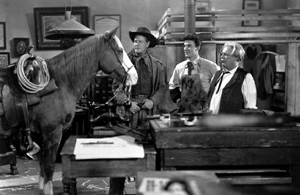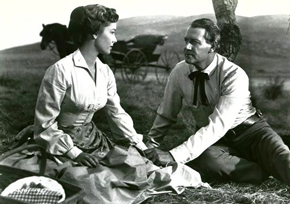
 |
|
|
|
Lovers of Sam Peckinpah's celebrated Ride the High Country will enjoy Wichita, a Joel McCrea western with a class-A pedigree. This least violent version of the Wyatt Earp story compensates mightily with a good cast and excellent direction. The consistently superior director Jacques Tourneur is a special secret known only in film circles. He gets full marks with classics in horror (Cat People, Curse of the Demon), film noir (Out of the Past, Berlin Express) and dramas without a specific genre (Experiment Perilous). Tourneur also made a series of individualistic westerns, the fine Canyon Passage and Great Day in the Morning among them. The director imposed a very personal 'gentle' touch on his best movies. Joel McCrea worked with him on the MGM "Bible" western The Stars in My Crown, and together they managed to make what might have been a preachy movie into a very moving one. This is one of producer Walter Mirisch's first full "A" productions. Mirisch and his brothers were already making their move toward United Artists and the big-talent formula that would make them the success story of the 1960s; Joel McCrea was a big help in establishing Mirisch's credibility. Allied Artists personnel like Richard Heermance and frequent Mirisch writer Daniel B. Ullman worked on many of Mirisch's 'transition' films. Ullman's script glamorizes some of the real Wyatt Earp's activities pre- the OK Corral, distorting some facts but establishing a still-relevant conflict between business interests and the public good. The local business association is pleased when rowdy cowboys spend their money in the bars, and don't mind that the cowboys shoot up the town and endanger lives. Earp resists becoming marshal after foiling a bank robbery, but goes into action when a stray bullet fells a 5 year-old boy (named Michael Jackson!). Earp arrests about twenty drunken cowpokes with only a shotgun, with apprentice reporter Bat Masterson (Keith Larsen) backing him up. Earp and young Laurie McCoy (Vera Miles of the next year's The Searchers) become an item, but her father Sam McCoy (Walter Coy, also of The Searchers) thinks Earp's 'no guns' policy will keep the cattlemen away. He wants the marshal fired. McCoy's less scrupulous friend Doc Black (Edgar Buchanan) wants Wyatt murdered, but inadvertently tries to contract the job to Wyatt's own brothers Morgan and Jim! (Peter Graves & John Smith). It soon looks as if all of Wichita is against the Earps. Lloyd Bridges gets third billing as Gyp Clements, a dishonest cowpoke who nurses a personal grudge against the new marshal. 
Director Tourneur's strong suit is his excellent work with actors -- regular western faces Wallace Ford, Jack Elam and Walter Sande are given stock roles but the direction makes all the difference. Each stands out as a thinking individual. As is typical with Tourneur films, eccentricities get our attention. Rather than make him ride his horse all the way around to the back of the building, publisher Wallace Ford just tells Earp to walk the animal right through his printing room. Typically nasty baddie Robert J. Wilke plays a reasonable cattle ramrod. He smiles and shakes Earp's hand, a very unusual thing to see actor Wilke do. Even the bad guys have three dimensions. Working against the movie is Ullman's thoughtful but placid script, which follows a predictable town-taming formula. Also, Joel McCrea's resolute and uncomplicated Wyatt Earp isn't as intriguing as the more interesting heroes of other Tourneur westerns. In Canyon Passage and Great Day in the Morning it isn't immediately apparent that Dana Andrews and Robert Stack are good guys -- their actions and motivations can be pretty unheroic. Although finished in Technicolor, Wichita also lacks the beautiful locations of those other Tourneur westerns. Generic rolling hills make southern Kansas look like a featureless nowhere. Tourneur's blocking of scenes is good, but he also seems a bit intimidated by the wide CinemaScope frame. This is a stock western made just before the big Television boom in 'oaters' -- but very well directed. One of the least appreciated of the great western stars, Joel McCrea holds the screen with authority, calmly facing off with gunslingers of all kinds, and inducing them to back down with pure psychology. He's a solid hero even if he looks a bit long in the tooth to be romancing young Vera Miles. Looking good in her Eastern-style dresses, Miles's Laurie character shows little concern being in love with a man likely to get shot at a moment's notice. Her mother Mary is played by Mae Clarke, the recipient of Jimmy Cagney's grapefruit in The Public Enemy. 
Producer Mirisch covered all bases in hopes of a big hit -- even hiring Tex Ritter to sing the undistinguished title song. Sam Peckinpah fans have another reason to watch Wichita -- the future wild-man movie director plays a polite bank teller in the robbery scene. Wichita is one of the few westerns to sketch a complete picture of the civic problem of cattle-trail cowboys busting up western towns. The real 'progress' represented by a railhead town is the big-business money made by cattlemen, beef buyers and the railroad, very little of which stays in town. The local saloon owners and brothel-keepers are the only locals profiting from carousing cowboys, and the money these businesses earn more or less determines what's legal and illegal on main street. The town motto "Everything Goes in Wichita" is an invitation to trouble. Wyatt Earp is pointedly shown pulling one of these banners down after the little boy is shot dead. Other westerns set up evil bad guys to take the rap for the killings and vice, whereas Wichita places responsibility squarely with the profit motive. You set up a town for the benefit of businessmen over citizens and corruption is bound to set in. Jacques Tourneur, of course, rarely allows any conflict to be rendered in black and white. The corrupt town leader, for instance, is the one to suffer the worst loss before he learns his lesson. 
The Warner Archive Collection DVD-R of Wichita looks great, with bright color and clear sound in an enhanced widescreen transfer. There's not much more to be said, as no trailer is included. One of the first releases from the Archive Collection last year, Wichita is a worthy old-fashioned western.
On a scale of Excellent, Good, Fair, and Poor,
Wichita rates:
Reviews on the Savant main site have additional credits information and are often updated and annotated with reader input and graphics. Also, don't forget the 2010 Savant Wish List. T'was Ever Thus.
Review Staff | About DVD Talk | Newsletter Subscribe | Join DVD Talk Forum |
| ||||||||||||||||||